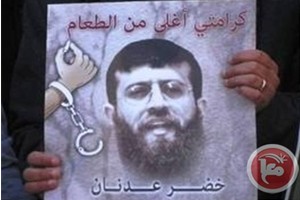
A Palestinian hunger striker on administrative detention is in danger of dying, Physicians for Human Rights (PHR) Israel said on Monday. According to PHR, 34-year-old Khader Adnan has been on a hunger strike since the day after his arrest by IDF troops at his home in the village of Arrabe near Jenin on December 17.
According to Ma’an Palestinian news agency detained Islamic Jihad leader Adnan says he will now refuse all liquids after 45 days without food to protest his treatment by Israeli authorities.

Adnan stepped up his hunger strike after prison authorities banned the latest visit from his lawyer, the Palestinian detainees center said. Adnan’s wife Randa said the Palestinian Authority justice ministry liaison with Israeli authorities told her on Monday. Adnan’s hunger strike will be life-threatening within three days.
On Sunday, Adnan was taken from the medical detention facility where he is being held in Ramle for treatment at Assaf Harofeh Medical Center in Tzrifin, where he refused to be given water or food.
Physicians for Human Rights Israel (PHR) said that Adnan has had nothing but water for 45 days, and his life is in danger if his hunger strike continues. They added that he launched the strike to protest his arrest, his treatment by interrogators, and administrative detentions, in which detainees are held without being charged with a crime.
Anat Litvin, director of Physicians for Human Rights’ Prisoners and Detainees Department, said in a statement released on Monday that “the fact that a person does not know when his detention will end nor the nature of the accusations brought against him, makes administrative detention unbearable, and similar to torture. Adnan’s hunger strike is clearly endangering his life, but should be also seen as a legitimate protest of a man trying to keep his dignity in face of gross abuse of his basic rights as a human being.”
In an affidavit to an attorney sent by PHR Israel, Adnan describes his arrest as violent that included threatening and humiliating Adnan’s family members. Adnan described that the soldiers broke into his house masked and guns drawn toward the family. According to his complaint, he was shackled hands behind his back and was taken by a jeep to the settlement of Mavo-Dotan discarded on the floor of the jeep. All during the drive he was kicked and slapped by the soldiers. When arriving to Mavo-Dotan he was detained outside at the freezing cold, his shackled hands swelling, his lower lip bleeding.
During the interrogation by the Israeli Security Agency (ISA, previously known as GSS), at Kishon detention center, Adnan was seated shackled to a chair tilted back in a position that caused him acute back pains with hands behind his back. The interrogators humiliated and cursed him, threatening to harm his family and his honor. According to his affidavit, humiliating insinuations were made using his religion.
Following one day of such harsh and humiliating interrogation, Adnan went on a full hunger strike, now entering its 45th day. Although on a hunger strike, Adnan’s interrogation continued, for long hours, until December 29th. From the 7th day of the hunger Strike Adnan refuses medical examination by the IPS.
PHR-Israel appealed urgently on 29 January 2012 to allow one of their physicians to see. Adnan, in keeping with guidelines drawn from the World Medical Association (WMA) Declaration of Malta of 1991, as well as Israeli law. A military medical officer has responded that this request was received and is in process. Adnan conditioned his referral to a hospital on being examined by PHR Israel’s physicians, when such a commitment was granted by the IPS, two of PHR-Israel’s doctors met him at the hospital, examined his condition and answered his questions regarding the current and predicted effects of his hunger strike. For now, he decided to continue his hunger strike.
According to the WMA, after the 42nd day of a hunger strike, it is expected that individuals will begin to lose their hearing and vision, and suffer bleeding in the gums, intestines, and esophagus. The body will gradually stop functioning. After the 45th day, there is a high risk of death due to vascular system collapse and/or cardiac arrest.
PHR Israel emphasize that IPS procedures regarding hunger strikers are unclear and some raise suspicion of violation of medical ethics. An appeal of PHR Israel’s ethic committee to the IPS during the hunger strike of Palestinian prisoners during September and October 2011 is yet without reply.
According to Litvin: “Administrative detention in Israel is carried out under a heavy veil of secrecy, and does not permit detainees to marshal the legal assistance or representation accorded to them by international law. Israel regularly keeps Palestinians in extended administrative detention without charging them, informing them of the charges against them, or allowing their attorneys to review evidence. Mr. Adnan’s case reflects this conduct and is in blatant disregard of both Israeli and international law, which are intended to ensure the right to liberty and due process, the right to be heard, and the presumption of innocence.”


